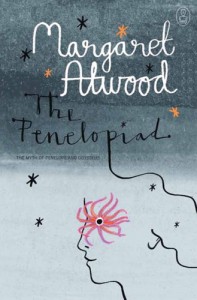Last night we read Margaret Atwood’s The Penelopiad, an interpretation of the life of Odysseus’ wife, Penelope, and of the twelve maids that are hung after the slaughter of the suitors. Atwood asks in her introduction, “What led to the hanging of the maids, and what was Penelope really up to?”
In class, we drew connections between the Helen/Penelope relationship of The Penelopiad and the Helen/Annie relationship in Bridesmaids.
- In The Penelopiad, Helen calls her cousin, Penelope, “little duck” or “little ducky.” In Bridesmaids, Helen constantly refers to Annie as Lillian’s “childhood friend,” and calls her “cute” or “sweet.”
- In The Penelopiad and Bridesmaids, Helen slyly draws attention to how she is prettier than Penelope/Annie, disguising it as a compliment or assurance. On page 154, Helen tells Penelope, “Divine beauty is such a burden. At least you’ve been spared that!” On the flight to Vegas, Helen tells Annie that having a little scotch is ok, that she does it all the time and is fine, “and I’m a lot smaller than you, so–”
- Star and Sandor pointed out a great one – on page 188, Helen tells Penelope, “We could do a trip to Las Vegas. Girls’s night out! But I forgot–that’s not your style.” Annie wanted to have the bachelorette party at Lillian’s family’s lake house.
Star found a great still from Bridesmaids showing that the airlines that the bridesmaids took to Vegas was called Spartan Airlines. Helen is in her element, buying everyone’s ticket so they can “experience First Class at least once in their lives.”

In The Penelopiad, Penelope tells us that the dead characters from these myths, such as Helen, Penelope, and Odysseus, can “have another try” at another life, being reborn into the modern world. Penelope explains, “Helen has had more than a few excursions. That’s what she calls them – ‘my little excursion'” (pg 187). Could Bridesmaids Helen be one of these excursions? Haunting.



I really enjoyed The Penelopiad by Margaret Atwood because it gave a voice to a character that previously has not been explored. At the beginning of the book Penelope says that throughout time she has been depicted as the faithful wife of Odysseus who spent twenty years just waiting for his return. She has lived on with a legacy of being “an edifying legend, A stick used to beat other women with” (Atwood, 2). She has become the story for which all other women should be compared to because of her ability to stand by her husband even in his absence.
In class today we discussed how previously Penelope has only been seen as noble and dignified but in this she does not come across this way. What is so interesting about Penelope is that as she gains a voice she becomes less dignified and that is what I like so much about her. She is clever and cunning and has flaws. A lot of people in class criticized her for frequently crying and sleeping through the action but in reality this makes sense to me. She was human and possessed flaws and that is what makes The Penelopiad so interesting.
Most of the book also centers around her jealousy/hatred for her cousin, Helen of Sparta. One of the chapters is entitled “Helen Ruins My Life.” While this seems petty and slightly bratty, it makes sense that Penelope feels that Helen is constantly ruining her life because her life DOES revolve around Helen. Penelope gets one year with Odysseus before he runs off to retrieve Helen and return her to her husband.
Overall, I enjoyed The Penelopiad because it made Penelope human and made her a more understanding individual.
Comparing the character of Helen Harris III to Helen of Troy requires examination into Helen of Troy’s motive. Is it easier to hate Helen if we think she seduced Paris and left with full knowledge of the death that would follow? The Penelopiad suggests that this is the case and we see Helen relishing in the men who die because of her. As a child, Helen is the cause of a war between Athens and Sparta, and “the part of the [war stories] she enjoyed the most was the number of men who’d died in the Athenian war: she took their deaths as a tribute to herself” (pg 75). This conniving Helen is easy to hate, but how does the perception that Helen was kidnapped against her will change or perception of her? Is she still a Queen Bee then? The Rape of Helen is a famous painting by Francesco Primaticcio, said to be in the western tradition of showing her being forcibly abducted (http://en.wikipedia.org/wiki/Helen_of_Troy#mediaviewer/File:Francesco_Primaticcio_003.jpg). Whether you think Helen was in love or stolen, it is undeniable that she is as fascinating a character today as she was 2500 years ago. Is Helen the timeless Queen Bee?
I don’t think that it is fair to compare Helen of Troy in The Penelopiad and Helen Harris III quite so much. Helen Harris III, for me at least, was an amazingly deep and flawed character, where as Penelope makes her out to be this self-obsessed bitch. And it may be that, if Annie wrote a book, I would be less forgiving of Helen, but, as far as the movie goes, she is just so scared. She was so well developed and so full of the same fears as Annie. “Bridesmaids” Helen was no Queen Bee, just a huge Wannabe